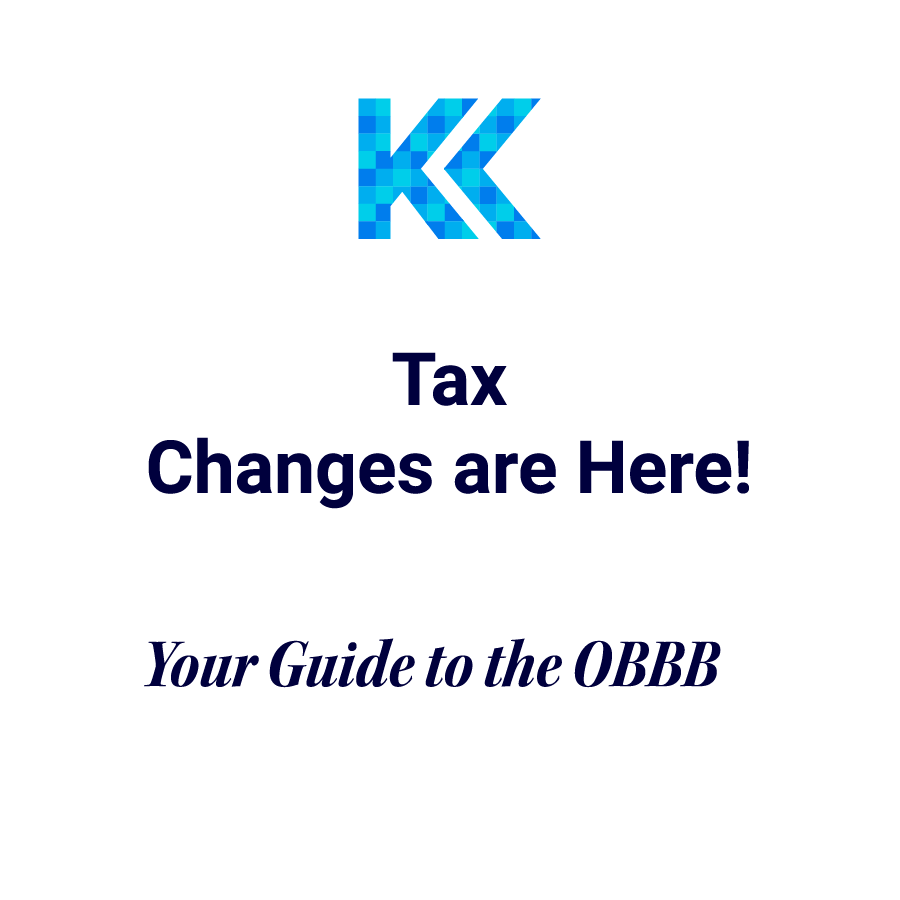The One Big Beautiful Bill (OBBB) was officially signed into law on July 4th, and it brings a ton of tax changes that impact nearly everyone (870 pages to be exact). While most media headlines are focused on a few flashy points that get people on both political sides fired up, the real takeaways are hidden in the details of the bill. From tips and overtime deductions to Trump accounts and bonus depreciation, I have spent countless hours dissecting the new bill to see what’s actually changing and what it means for you.
Lower Tax Brackets are Here to Stay
The current tax brackets we have were set to revert back to their pre-2017 TCJA (Tax Cuts and Jobs Act) levels. This would have increased taxes, but the lower brackets have been made permanent.
Here is what would have happened:
10% –> 12%
12% –> 15%
22% –> 25%
24% –> 28%
32% –> 33%
37% –> 39.6%
Higher Standard Deduction
The standard deduction that was nearly doubled as part of the 2017 TCJA is not only hear to stay for both single and married filers, but is also getting an additional increase.
Single Filers: $15,000 increased to $15,750
Married Filing Jointly: $31,000 increased to $31,500
SALT cap Increase (State and Local Tax Deduction Limitation)
Previously, taxpayers were only allowed to deduct up to $10,000 in state and local taxes from their federal return, referred to as the SALT cap.
2025 SALT cap increase: $10,000 –> $40,000
The deduction starts to phase out for high-income earners with MAGI above $500,000. Business owners will still be able to get around this using the PTET (pass-through entity tax election) loophole that allows them to pay state and local tax at the business level, avoiding the SALT cap.
Trump Accounts
The tax bill also created a new type of tax-advantaged savings account for kids, called the Trump account. Children born between 2025-2028 will get a $1,000 contribution from the government. You can contribute $5,000 annually to the account while the child is under 18 on an after-tax basis. The contributions are automatically invested in a US Stock index fund, and grow tax-deferred from gains, interest & dividends.
At 18, half of the account balance may be withdrawn penalty-free for qualifying expenses such as education, small business, or first home purchase, with earnings taxed at long-term capital gains rates. A withdrawal for any other purpose will incur a 10% penalty + tax at your higher ordinary rate. Another half of the account becomes available under the same rules at age 25, and any remaining balance at age 31 will be distributed to you with earnings taxed as ordinary income.
Tips and Overtime
I have been seeing a lot of misinformation surrounding this, that there is now “no tax on tips and overtime”. This is not accurate, but there will now be a federal deduction for tips & overtime wages until 2028.
Tips: Deduction on first $25,000 tip income
Overtime: Deduction on first $12,500 OT income ($25,000 if married)
This deduction starts to phase out if your MAGI is over $150k single or $300k married.
Estate Tax Exemption Increase is Permanent
As part of the 2017 TCJA, the estate tax threshold was doubled from just under $5.5M to over $11M. Estate tax is hefty with a top rate of 40%, so this increase saved high net worth families big in tax. It was set to revert back to the lower threshold in 2025, but the new tax bill has made the higher limits permanent.
New Estate Tax Thresholds: $15M for single, $30M for married couples
If you’re going to be above these thresholds when you pass, there are still many advanced trust strategies in play to minimize estate tax, or even reduce it to zero.
Bonus Depreciation Increase
This is absolutely massive for real estate owners & investors. Bonus depreciation allows property owners to take huge tax deductions on qualifying property in the first year of purchase, allowing for greater flexibility with advanced tax strategies that offset other income. This allows us to strategically score big deductions in our highest income years while we are in a higher tax bracket. This bonus depreciation was set to drop to just 40% on most qualifying property in 2025, but is now back to 100%.
100% Bonus Depreciation is now effective for property bought after January 20, 2025.
HSA Access
HSA access has been expanded to both the Bronze and Catastrophic ACA (Affordable Care Act) plans, rather than just those with HDHPs.
Certain services, such as telehealth and Direct Primary Care, are now eligible HSA expenses.
Child Credit
The $2,000 child tax credit that came with the 2017 TCJA is now permanent and will increase with inflation going forward.
Senior Deduction
The senior tax deduction for those over the age of 65 will provide a $6,000 deduction for single filers and $12,000 deduction for married couples. This deduction starts phasing out if your income is above $75,000, or $150,000 if you’re married.
Gambling
I do have to say that I’m quite baffled by the new 90% limitations on gambling losses that are part of the new bill. It could cause gamblers who lose money to still pay tax on phantom income.
Example: A gambler has a down year with 400k in total buy-ins and only 380k in winnings, a 20k net loss, would be taxed on 20k phantom income. (380k – 90% of 400k)
Final Thoughts
The OBBB extends out most of the taxpayer-friendly provisions that were set to expire after being implemented in 2017. It has also introduced some exciting new tax planning opportunities, if you know where to look in the bill. As always, it’s not just about what the law says, but how you use it. With changes this big, the best plan is to start reviewing your tax strategy well before April comes around next year.

– Clint Kraft
Founder and Financial Advisor, Kraft Capital

